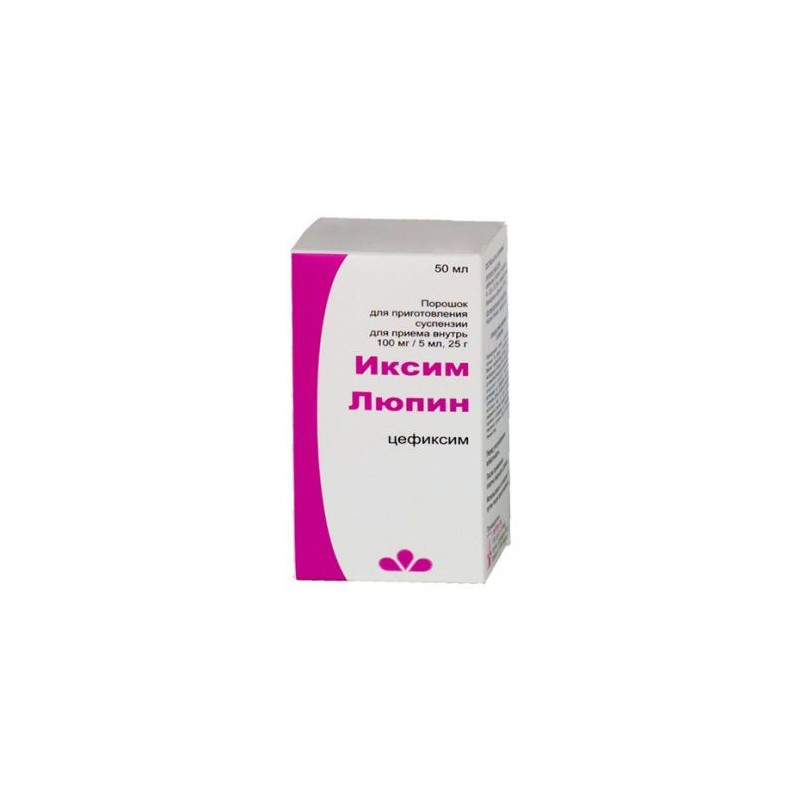



 All payments are encrypted via SSL
All payments are encrypted via SSL
 Full Refund if you haven't received your order
Full Refund if you haven't received your order
Antibacterial broad spectrum, bactericidal. Inside. For adults and children over 12 years old weighing more than 50 kg of average daily dose - 400 mg (1 r per day or 200 mg 2 r per day) - 7–10 days. Up to 12 years as a suspension in dose 8 mg / kg once or in 2 doses (4 mg / kg every 12 hours). From 6 months to 1 year daily. - 2.5–4 ml, 2–4 years - 5 ml, 5–11 years - 6–10 ml.
The broad spectrum antibacterial effect consists in the ability of antimicrobial agents to exert a bactericidal and / or bacteriostatic effect on a wide range of infectious pathogens.
The tubular secretion blockers (allopurinol, diuretics, etc.) delay the excretion of cefixime by the kidneys, which can lead to an increase in toxicity. Reduces prothrombin index, enhances the effect of indirect anticoagulants. Antacids containing Magnesium or aluminum hydroxide, slow down the absorption of the drug.
In a dry, dark place at a temperature of from 15 to 25 ° C. Keep out of the reach of children.
Infectious and inflammatory diseases caused by susceptible microorganisms: pharyngitis, tonsillitis, sinusitis; acute and chronic bronchitis; otitis media; uncomplicated urinary tract infections; uncomplicated gonorrhea.
Hypersensitivity to cephalosporins and penicillins. With care: advanced age; chronic renal failure; pseudomembranous colitis (in history); children's age (up to 6 months).
Allergic reactions: urticaria, skin flushing, pruritus, eosinophilia, fever. On the part of the digestive system: dry mouth, anorexia, nausea, vomiting, diarrhea, flatulence, abdominal pain, dysbacteriosis, abnormal liver function (increased activity of hepatic transaminases, alkaline phosphatase, hyperbilirubinemia, jaundice), gastrointestinal candidiasis; rarely - stomatitis, glossitis, pseudomembranous enterocolitis. From the side of blood-forming organs: leukopenia, neutropenia, thrombocytopenia, hemolytic anemia. On the part of the urinary system: interstitial nephritis. Of the nervous system: dizziness, headache.
Inside For adults and children over 12 years old weighing more than 50 kg, the average daily dose is 400 mg (1 time per day or 200 mg 2 times per day). The average duration of treatment is 7–10 days. With uncomplicated gonorrhea - 400 mg 1 time per day. Children under the age of 12 are prescribed as a suspension at a dose of 8 mg / kg once or in 2 divided doses (4 mg / kg every 12 hours). For children aged 6 months to 1 year, the daily dose of the suspension is 2.5–4 ml, at the age of 2–4 years, 5 ml, at the age of 5–11 years, 6–10 ml. For diseases caused by Streptococcus pyogenes, the course of treatment is at least 10 days.In case of impaired renal function, the dose is established depending on the serum creatinine clearance indicator: with a creatinine Cl of 21–60 ml / min or in patients on hemodialysis, the daily dose should be reduced by 25%. With Cl creatinine less than or equal to 20 ml / min or in patients on peritoneal dialysis, the daily dose should be reduced by 2 times. Method of preparation of the suspension: turn the bottle and shake the powder. Add 40 ml of boiled water cooled to room temperature in 2 stages and shake after each addition to form a homogeneous suspension. After that, it is necessary to allow the suspension to settle for 5 minutes to ensure complete dissolution of the powder. Before use, the finished suspension should be shaken.
Patients with a history of allergic reactions to penicillins may have an increased sensitivity to cephalosporin antibiotics. With long-term use of the drug may disrupt the normal intestinal microflora, which can lead to the growth of Clostridium difficile, cause severe diarrhea and pseudomembranous colitis. During treatment, a positive direct Coombs reaction and a false-positive reaction of urine to glucose are possible.
